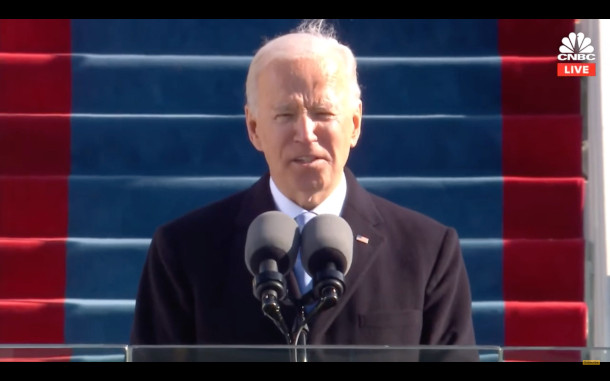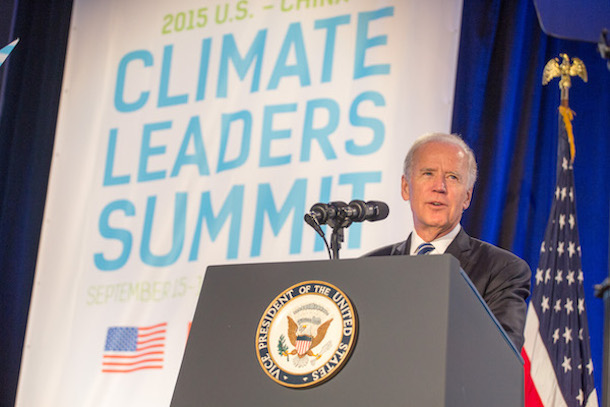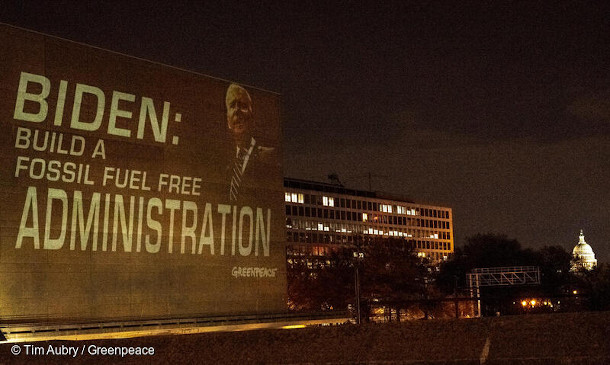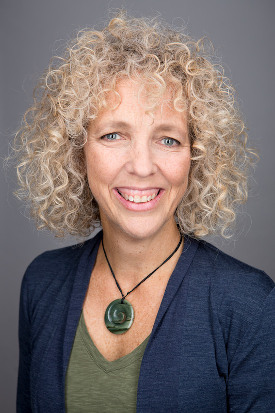U.S. Back in Paris Agreement
Air Date: Week of January 22, 2021

President Joe Biden at his inauguration ceremony January 20, 2021 at the Capitol Building in Washington D.C. (Photo: Screenshot of Presidential Inauguration)
On his first day in office, President Biden recommitted the United States to the Paris Climate Accord. Jennifer Morgan, Executive Director of Greenpeace International, joins Host Steve Curwood to discuss the actions the United States must take to get back on track with the Paris climate plan, after four years of turning its back on climate diplomacy.
Transcript
BASCOMB: From PRX and the Jennifer and Ted Stanley Studios at the University of Massachusetts Boston, this is Living on Earth. I’m Bobby Bascomb.
CURWOOD: And I’m Steve Curwood.
Well, the US is now headed back into the Paris Climate Agreement thanks to a letter President Biden sent on the afternoon of his inauguration. It was among a dozen executive actions and orders, including many aimed at reversing former President Trump’s environmental rollbacks. But time, the climate emergency and the world have moved on, and the US can’t simply re-engage using the old Obama Administration playbook. Joining us now from Berlin, Germany to talk about what this means for global climate progress is Jennifer Morgan, former climate advisor to the German government and the executive director of Greenpeace International. Welcome back to Living on Earth, Jennifer!
MORGAN: Thanks. Great to be here.
CURWOOD: So now that the United States has sent that letter requesting to rejoin the Paris Climate Accord, what should it start working on right away?
MORGAN: Well, the first thing it needs to work on is what it's going to do domestically in the United States, to both reduce the emissions that cause climate change but also bring a lot of benefits along with that including new jobs, clean air. So that means investing in renewable energy. That means getting any recovery package that comes in to deal with the horrible COVID crisis to be going towards zero carbon emissions, laying the groundwork for that kind of infrastructure. That also means though stepping up and supporting the most vulnerable countries in the world that are suffering already from the impacts through aid, through capacity building, through technology transfer and really putting science at the middle of all of it.
CURWOOD: So technically, the US only came out of the Paris Climate Agreement in November, but de facto of course former President Trump pretty much sat on his hands for the past four years. What opportunities has the US missed in terms of the international negotiations as well as things that we could do at home over these past four years?

President Joe Biden during the 2015 Climate Leaders Summit. (Photo: Courtesy of the Biden-Harris Climate Task Force)
MORGAN: They've missed quite a lot. I mean, I think as far as really countries that are moving forward to solve problems together for example you know dealing with the impacts of climate change themselves. So adapting to those impacts, and knowing how to do that in a way that takes care of the most vulnerable communities in their countries. They've missed a lot of the you know parts of the renewable energy boom, which again, is around self sufficiency, energy independence in countries where you just have seen renewables now competing or out beating fossil fuels in many countries around the world. I think they've also really missed a sense of collaboration that's moved forward that had to, because it wasn't only that the former Trump administration was not wanting to move along. They were opposing it all along the way. So there's a sense of solidarity. And I think that the administration now needs to re-enter that whole area with some humility, because others had to move forward. They couldn't wait and did not do the extent that was needed, but certainly quite a bit.
CURWOOD: Drill down for me for a bit about some of the damage that was done so far by the United States leaving the Paris Climate Agreement?
MORGAN: Well, for one, I mean, I think there's two areas there. One is that it just makes things much harder. So if you have a White House, or you have a chancellery or you have a prime minister that is leading and moving forward in, for example, removing fossil fuels from different financing industry, banks, you know, whether it be the World Bank, or whether it be bilateral banks. Then you can move quickly together on that, versus if you have someone that's trying to pull you back the whole time. I think the other area is that the former Trump administration gave a lot of cover for those other countries that also that wanted to pull back Brazil, for example, on Bolsonaro, or the Russians, for example, or Saudi Arabia. And that, again, is kind of it was more like moving through mud, to make progress, rather than being on that, you know, sustainable astroturf.
CURWOOD: What about some of the financing that's part of the UN process here? What promises had the US made in the past for financing climate change research, helping with adaptation and such do we need to play catch up with now?
MORGAN: The US definitely has to play catch up, I think both in funding that it had committed to the Green Climate Fund, which is the fund that was created in order to support poor and developing countries both in dealing with the impacts and adapting to climate change and to moving forward and implementing solutions. You know, you had a whole effort that was underway in the research field not only to fund research, but also to allow scientists to do their job and not stop them from doing their job. I think, you know, another area there really also that is not necessarily part of Paris, but kind of which is around financial regulation. You know, we can't have just voluntary initiatives anymore of banks committing not to fund this or that we need a financial system that actually treats climate risk and potential stranded assets as a material risk, and regulates around that. And I think that's another area where the US is gonna have to play some catchup but can certainly play a really important leadership role Under Secretary Yellen.

The Biden Administration has promised to lead the United States towards a path of a 100% clean energy and net zero emissions economy by the year 2050. (Photo: Tim Aubrey, Greenpeace)
CURWOOD: So the advent of the Biden administration takes us back in some respects more than a decade to the advent of the Obama administration, with a major climate talk coming up. For Obama, it was Copenhagen this year, we'll see a major set of talks in Glasgow. The Obama administration never put together a task force for all the federal agencies and such to figure out what to do at Copenhagen. What advice if any, do you have for the Biden administration to prepare for the upcoming session at Glasgow?
MORGAN: Well, I think this is going to be a very important meeting, my advice would be to take the approach that they're doing on the national level, which is to have it across all the different agencies from transportation to interior to you know, energy, obviously, and through special envoy Kerry do that on the global level. So that it's not only them bringing, which is a precondition, a much stronger reduction target for the US to bring back into the Paris Agreement but it is also about bringing climate and for example, removing away from fossil fuels into all of US foreign policy. And I think going into Glasgow, it's not just a one off meeting, it's really the moment I think, for world leaders to demonstrate that they're about the well being of people and the planet over this short term economic growth. And I think they have a tremendous chance Biden and Harris to bring their environmental justice and racial justice agenda on the domestic level, into the international agenda. Oftentimes in the United States, but also around the world, you see polluting industries, fossil fuel development happening in low income, often people of color communities and that needs to obviously stop. And those communities need to have the funds to help restore. On the global level, think about a small island, think about a small farmer in Africa that is suffering from drought and has no longer any kind of income, and oftentimes will then migrate and contribute to conflict somewhere else. What is the responsibility of the United States and I would even say, the companies of the United States that have caused so many of these emissions to taking care of those people, and certainly not their fault, they had nothing to do with the problems that are being solved. But the US is a key player and taking care of those people and that's known as dealing with their loss and their damages.
CURWOOD: So let's look across the international environment and tell me how you think that folks in that community are responding now to the United States, getting back into the Paris Climate Agreement? And what kind of position rather than trying to be seen as just a as a leader? Should the United States be trying to position itself as?
MORGAN: Well, I think I mean, I can't tell you how, like it was like a collective sigh of massive relief of the fact that you have moved from a climate denier White House to an administration that has said that climate is one of four priorities moving forward, I think that people are curious countries are curious of how the US is going to reengage in this, they will look for that credibility on domestic action and transforming the US economy. And I think they would say to this administration the world is different than it was four years ago. And they're ready for partnership with the US but also noting that the US can learn a lot from other countries right now and what they've been through. In you know, the European Union, although it's not as strong as it should be on the science has a Green Deal. It is moving forward and moving to a zero carbon economy. So a readiness though, a readiness, a curiosity, but also a bit of not trepidation, but just, you know, nervousness of, of a US that comes with exceptionalism, when actually I think the US needs to show a lot of humility right now.
CURWOOD: By the way, what's going to be the toughest opposition for the United States getting back into the international climate agreements not just at home, but abroad?

Jennifer Morgan is the executive director for Greenpeace International. (Photo: Bas Beenties, Greenpeace)
MORGAN: Opposition abroad, I think will come depending on what the US what the Biden Harris administration does at home. So I think there will be opposition if the administration were to re enter and start to kind of tell others or encourage others to do more when it hasn't done its own work at home. I think there'll be opposition coming from the most vulnerable countries looking for the support coming from the US, even kind of the back payments of what the US hasn't yet paid. And, you know, if the US and the Biden administration is really driving the way that they are saying then then maybe they'll even see some opposition from some of the former Trump allies like the Saudi Arabians or the Russians because optimally, this administration needs to be driving the world away from fossil fuels in every single way that it can, as quickly as it can. And so a measure of what success would be that the opposition would be coming from those fossil fuel producers.
CURWOOD: And just to be clear, the three largest exporters of liquid hydrocarbons in the world are Saudi Arabia, Russia and the United States of America. There's a distance to go there politically for the US. How does the US get there?
MORGAN: There is a distance to go and I think it's the US gets there by setting a pathway for the phase out of fossil fuels, providing a just transition for workers that are currently in that sphere, ramping up their work on other solutions, working with communities to do that, and doing that together in a unifying way. And I think there's no choice now the science is so clear we have so little time. And so it's that kind of joint work and collaboration with that set goal that I think the US could provide some leadership on.
CURWOOD: Jennifer Morgan is the executive director of Greenpeace International. Thanks so much for taking the time with us today, Jennifer.
MORGAN: Great to be here.
Links
Click here to watch the inauguration of President Joe Biden and Vice President Kamala Harris
New York Times | “Biden Cancels Keystone XL Pipeline and Rejoins Paris Climate Agreement”
Living on Earth wants to hear from you!
Living on Earth
62 Calef Highway, Suite 212
Lee, NH 03861
Telephone: 617-287-4121
E-mail: comments@loe.org
Newsletter [Click here]
Donate to Living on Earth!
Living on Earth is an independent media program and relies entirely on contributions from listeners and institutions supporting public service. Please donate now to preserve an independent environmental voice.
NewsletterLiving on Earth offers a weekly delivery of the show's rundown to your mailbox. Sign up for our newsletter today!
 Sailors For The Sea: Be the change you want to sea.
Sailors For The Sea: Be the change you want to sea.
 The Grantham Foundation for the Protection of the Environment: Committed to protecting and improving the health of the global environment.
The Grantham Foundation for the Protection of the Environment: Committed to protecting and improving the health of the global environment.
 Contribute to Living on Earth and receive, as our gift to you, an archival print of one of Mark Seth Lender's extraordinary wildlife photographs. Follow the link to see Mark's current collection of photographs.
Contribute to Living on Earth and receive, as our gift to you, an archival print of one of Mark Seth Lender's extraordinary wildlife photographs. Follow the link to see Mark's current collection of photographs.
 Buy a signed copy of Mark Seth Lender's book Smeagull the Seagull & support Living on Earth
Buy a signed copy of Mark Seth Lender's book Smeagull the Seagull & support Living on Earth

